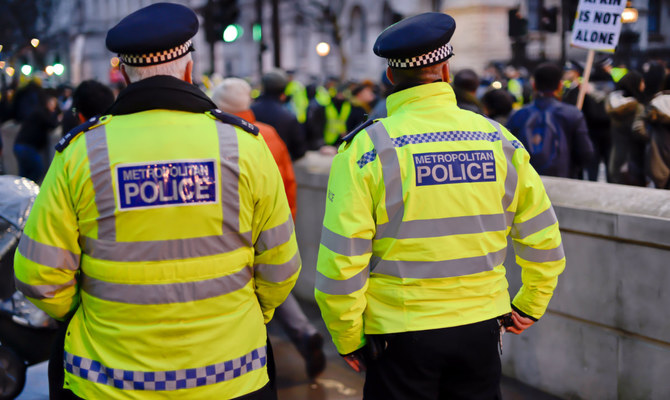LONDON: The UK’s Metropolitan police is facing calls to prosecute a former senior Iranian government official accused of endorsing the fatwa against author Sir Salman Rushdie.
Met officers are examining a legal case file that accuses Sayed Ataollah Mohajerani, who lives in London, of violating the Terrorism Act 2006 by promoting terrorism, the Guardian newspaper reported on Monday.
The fatwa against Rushdie, following publication of his 1988 novel “The Satanic Verses,” was issued in February 1989 by Ayatollah Khomeini, who was Iran’s supreme leader at the time. It has never been lifted. In August 2022, Rushdie was stabbed several times and seriously injured while appearing on stage at a literary festival in New York.
A complaint was filed against Mohajerani that same month by Iranian human rights lawyer Kaveh Moussavi and British solicitor Rebecca Mooney, according to the Guardian. It states that Mohajerani was deputy to the Iranian prime minister in 1988 and vice-president for parliamentary and legal affairs between 1989 and 1997, a period of time during which the regime in Tehran ordered the assassinations of hundreds of dissidents in Europe.
Moussavi and Mooney allege that Mohajerani did not attempt to prevent the killings and, since moving to the UK, he has on several occasions lauded as an Iranian national hero Gen. Qassem Soleimani, the former commander of the Islamic Revolutionary Guard Corps’ Quds Force, who was killed by a US drone strike in January 2020 in Iraq.
They also say that in his 1989 book, “A Critique of the Satanic Verses Conspiracy,” Mohajerani defended the fatwa against Rushdie and clearly expressed his view that it was religiously justified and irrevocable, and therefore impossible to withdraw.
Mohajerani denied the allegations and said his book is simply a critique of Rushdie’s novel that aims to shed light on its religious origins, the Guardian reported.
“When Salman Rushdie was attacked by an American citizen, I tweeted that I hope Salman Rushdie will recover from this event, and based on William Falkner’s advice, write a novel through concentrating on the beauties and moral values, at the service of human beings,” Mohajerani told the Guardian.
“On the contrary, in ‘The Satanic Verses,’ he added a huge amount of oil to the fire. Hopefully he will find a proper chance to correct himself.”
Mohajerani also said that because of the separation of powers between the judiciary and the executive in Iran, he had no role in the executions of prisoners in 1988.
Moussavi condemned Mohajerani’s defense as being “indicative of his culpability.”
“The idea that this is or was an independent judiciary is plain absurd. That he repeats it confirms again who he really is,” he told the Guardian.
“In law, he was required to protest and do his utmost to stop these crimes and, if unable, he must resign. I doubt very much if his defense counsel will offer these concoctions in a court case, as defense or mitigation.”
Police in London have reportedly said that the complex issues raised by the case file will require significant resources and additional time to investigate.
Mooney, representing the human rights charity Ending Immunity, highlighted the obligations on UK authorities to prosecute international crimes under international law.
“The first duty of the state is to protect its citizens — that requires preemptive, prosecutorial and punitive measures where appropriate,” she said. “That is why we have terrorism laws, including (laws against) promoting terrorism through speech. It is meaningless to have these laws if we do not prosecute.”













